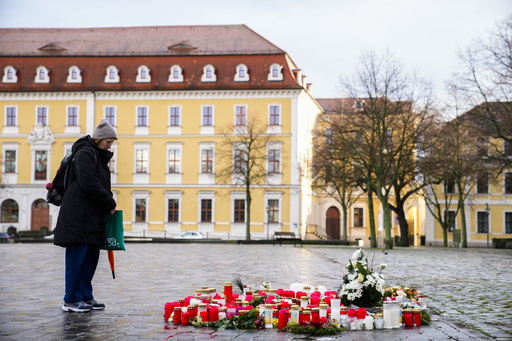
MAGDEBURG, Germany — A tragic incident during a bustling Christmas market has left four women and a 9-year-old boy dead, with nearly 200 others injured. This attack has plunged the nation into mourning and raised concerns about safety during such festive gatherings in the German city of Magdeburg.
What transpired during the attack?
Initially mistaking the unsettling noises for fireworks, Thi Linh Chi Nguyen, a 34-year-old manicurist from Vietnam, was on the phone during her break when she heard sounds just after 7 p.m. on Friday. To her horror, she witnessed a vehicle racing through the market, as chaos erupted among the crowd, with people screaming and a young child being thrown into the air by the impact.
Nguyen narrated the moment she saw the car exit the market at high speed, veering onto Ernst-Reuter-Allee and eventually halting at a tram stop where the driver was apprehended. Despite concrete barriers meant to deter such incidents around the market, a gap left for emergency access allowed the car to breach the area.
Following the attack, the market reopened on Sunday, with residents moving slowly past the vacant stalls laden with food, drinks, and crafts. Many stopped to pay their respects by lighting candles and laying flowers at a growing makeshift memorial for the victims.
Identifying the victims, authorities reported that the deceased included four women aged 45, 52, 67, and 75, alongside a 9-year-old boy named André Gleissner. He was part of the children’s fire brigade in the Elm-Asse region located west of Magdeburg. Out of the approximately 200 people injured, 41 were reported to be in critical condition and receiving treatment at various hospitals in Magdeburg, approximately 130 kilometers (80 miles) west of Berlin.
Who is the alleged perpetrator?
The suspect, identified as a 50-year-old Saudi national, is currently facing charges of murder, attempted murder, and bodily harm. Following a closed judicial proceeding, a judge ordered him to remain in custody while authorities consider formal charges. Local media outlets have named him as Taleb A., with his full identity withheld due to privacy regulations, mentioning that he specializes in psychiatry and psychotherapy. Residing in Germany since 2006, he practiced medicine in the town of Bernburg, around 40 kilometers (25 miles) south of Magdeburg.
His social media presence purportedly indicates a shift away from Islam, featuring anti-Islam sentiments and critiques of the religion while congratulating Muslims who have left the faith. The suspect has also expressed dissatisfaction with German authorities for not doing enough to resist what he termed the “Islamification of Europe,” and has shown support for the far-right, anti-immigration Alternative for Germany (AfD) party.
What could have propelled this attack?
Investigators are currently sifting through the suspect’s digital footprints, looking into computers, mobile devices, and other materials to ascertain the motives behind his actions. Prosecutors have suggested that his actions may stem from “dissatisfaction with the treatment of Saudi refugees in Germany.”
Recent intelligence assessments indicate a rising trend where assailants possess mixed ideologies and motivations. Officials, like MI5’s head, have highlighted that labels such as “Islamist terrorism” or “extreme right-wing” do not encompass the complexity of beliefs observed in recent attacks.
There are lingering questions regarding what authorities knew about the suspect’s background. The head of Germany’s Federal Criminal Police Office, Holger Münch, acknowledged receiving a vague warning from Saudi Arabian officials in November 2023. Reports indicate that although the suspect produced frequent online content and interacted with various entities, he was not marked as violent.
Amid increasing criticism regarding security measures, Chancellor Olaf Scholz faced backlash during a visit to Magdeburg, where he was met with discontent from some onlookers.
A pattern of violence
The country is reeling from the shock of this attack, which led multiple cities to cancel Christmas markets out of caution and solidarity with Magdeburg. In contrast, Berlin opted to maintain its holiday festivities but increased police patrols.
Germany has witnessed a series of extreme acts in recent years, including a knife attack in Solingen resulting in three fatalities in August. This latest assault mirrors an incident from eight years prior when an extremist drove a truck into a Christmas market in Berlin, leaving 13 dead and many injured.
As the nation grapples with another act of mass violence, the ongoing migration debate is poised to play a significant role in the upcoming early election scheduled for February 23. The use of vehicles as weapons employed by various extremist factions accentuates a troubling trend linked to acts of terror worldwide.
